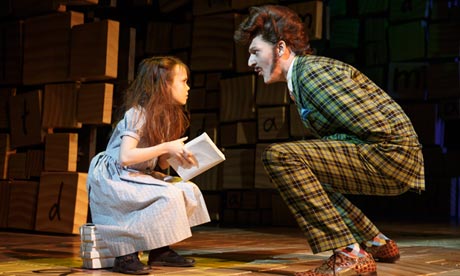
The RSC's Matilda opened on Broadway this week, and it was so good, people in the theatre wiped their eyes and mouthed to each other: "Oh my God, this is so good." It was so good, the unfamiliar score sounded like something you'd been singing since your middle-school production.
Plaudits from the London run precede it, of course – the show won a slew of Olivier and Critics' Circle awards – but there is tough competition on Broadway, and not everything travels. In the event, it was the show's very Britishness that proved key to its delight: specifically, its flippant verbosity – practically Russell Brand-esque – and a cast of children who looked and sounded like children, not miniature 30-year-olds.
The book is one of Roald Dahl's weakest (if Matilda can Do Magic, why doesn't she magic her rotten parents away?) and the 1996 film an off-putting introduction. In the film, the children are self-consciously obnoxious and standard-issue cute. The stage production draws on different traditions, away from Hollywood and into the rude, cartoony glory of the Bash Street Kids and Marmalade Atkins and Johnny Briggs, which writer Dennis Kelly (42) and Tim Minchin (37), who composed the music and lyrics, are of an age to have grown up with.
It moves between silly and sharp to satirical and serious, with an aggressive pro-literacy agenda. How can you fail to love a show that contains both a kid doing an epic burp and the line, delivered by Matilda's philistine father: "Ian McEwan / feel like spewin'"?
Matilda, the neglected child of buffoonish parents who think reading gives you "head-lice of the soul", is a genius, and Minchin's lyrics play up to this. There is an element of the performing seal about a 10-year-old singing words such as "narcolepsy" and "subsequent" and "atmospheric disturbance", and to conduct half a scene in Russian. The kids in this production are American but their accents are spot-on. As you watch, you marvel at just what you can train a clever child to do. The lyrics are so involved you have to strain to make them out at times, but the timing is perfect and the delivery boisterous, rather than arch.
The grown-up star of the show is Bertie Carvel, in drag as Miss Trunchbull, a perfectly rendered grotesque that taps into everyone's deep, atavistic fear of the PE teacher and her apparatus. Carvel's comic performance is up there with the greats, a combination of Alastair Sim, the twitching mania of Herbert Lom, a bit of Joyce Grenfell and – am I imagining it? – just a hint of Celia Johnson in Brief Encounter, the tremulous, breathy voice simultaneously funnier and more sinister than any amount of bellowing. Trunchbull minces around on feet too small for the breadth of her shoulders, quivering, singing flat, chasing an imperious toss of the head with a squeak of deflation, like air escaping from a rock-hard inflatable. The people in my row weren't laughing so much as giggling like children – a much harder response to trigger, I think.
Over at the Palace, a good production of Annie is ongoing, but it's a conventional show, the children highly stylised and singing in expert vibratos. Matilda's lot are anarchic, the choreography (by Peter Darling), full of jerky kid moves; they throw kung-fu shapes and pretend to be motorised, which is how kids in high spirits actually move, rather than as if they're auditioning for Flashdance. There's the dishevelled fat kid, the attention-deficit kid kicking off in the corner, the kid with mad hair (actually, they all have mad hair) and when they sing, the verbosity falls away and the lyrics hit home: "When I'm grown up I'll eat sweets every day on the way to work and I'll go to bed late every night." It is something you don't often see: innocence convincingly rendered. No one does a backflip.
For a musical really to fly it needs solid bones, and beneath the razzle Matilda's are good. It speaks against helicopter parenting on the one hand, and telly-as-the-babysitter on the other. At a pinch – and to be terribly Guardian about it – you can find a subtext on class mobility in there, with Matilda's big opening number about challenging predesignated outcomes.
Really, though, it's just incredibly good fun. Seeing it on Broadway, there were a couple of culture-gap moments: the US audience laughed heartily the first time the kids appeared on stage, at what were clearly perceived to be gothic costumes, but were in fact bog standard primary-school uniforms. And the period details will mean nothing in the US: the test card from the TV, and – where did the props person find it? – a C&A carrier bag, which lent the show a wacky nostalgia.
Matilda is conventional where you need it to be, with the two tender numbers, This Little Girl and My House put there to drag at your heart, and they do. But the lasting impression is one of pure joy. When the dishevelled kid jumped on a desk and did an impression of a torch song – and mark, it was a goofy impression, not an attempt at the real thing – the theatre erupted. There is nothing out there more charming.

